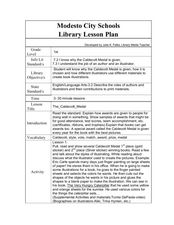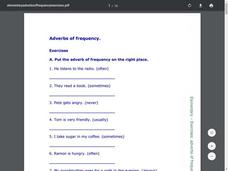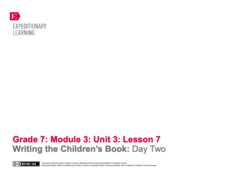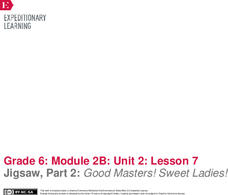Curated OER
Scene Writing: Literacy and Playwriting
Drama is ever-present in our daily lives and eloquently depicted on stage. Middle schoolers practice writing scenes based on different prompts and frameworks, and then perform those creative scenes for their classmates. The activities...
Lakeshore Learning
Winter Bear Warm-Up
Don't be left out in the cold, ensure young learners are prepared for the winter weather with this clothing activity. After introducing them to different clothing items using the provided picture cards, students sing a song before...
Curated OER
Reading Strategies: Main Idea
Identify the main idea and the supporting details of a story in a literacy resource from Discovery Education. Complete with procedures, vocabulary, and assessment activities, this is a great way for pupils to practice their outlining...
Curated OER
Authors and Illustrators: What do they do?
Help readers understand the roles of authors and illustrators and why they have been recognized by medals of excellence. Your class will discuss and then create illustrations for a book. When they have finished, you can hold your own...
Curated OER
George vs. George Essay Pre-writing
To practice pre-writing techniques your class will re-read the book George vs. George and complete a T-chart along with brainstorming ideas on how to organize their essay.
Curated OER
Dr. Seuss - Make Time for Rhymes
Read the story Green Eggs and Ham to practice phonemic awareness, rhyming, and writing skills with emerging readers. They will match oral words to printed words, create a graphic organizer, and the use rhyming words in an original...
Curated OER
"Monsters Are Due on Maple Street" by Rod Serling
These questions ask learners to think about the text "Monsters Are Due on Maple Street" in a variety of ways. In addition to practicing reading comprehension, class members work on interpreting, making inferences and connections,...
PBS
Talking to Myself: Hamlet’s Soliloquies
If you’re a first time teacher of Hamlet—or any Shakespeare play, this resource will help keep your head above water. Included are copies of Hamlet’s soliloquies, worksheets for student work, and high-quality videos that demonstrate to...
Curated OER
The Goldilocks Rules for Choosing a Book That Is “Just Right”
With so many books to choose from, it can be hard for young readers to find the right one. Help children overcome this problem with this list of rules for identifying books that are too easy, too hard, and those that are just right.
K12 Reader
Using Collective Nouns
What do you call a group of soccer players? Or a bunch of bees? Young grammarians review eight sentences and add the correct collective noun based on the context clues they observe.
Novelinks
The Martian Chronicles: Double-Entry Journals
Teach learners to reflect on their reading with a lesson about double-entry journals. As they read Ray Bradbury's The Martian Chronicles, class members note interesting passages from the text on the left side of their page, and jot down...
Syracuse City School District
Greek and Latin Roots, Prefixes, and Suffixes
How can adding a prefix or suffix to a root word create an entirely new word? Study a packet of resources that focuses on Greek and Latin roots, as well as different prefixes and suffixes that learners can use for easy reference.
Curated OER
Lesson 3: Puns
Encourage more pun-derstanding of word play in your literary scholars as they explore Brian P. Cleary's book Rhyme and Punishment: Adventures in Wordplay. Although this isn't suggested, consider beginning this study by simply showing...
Prestwick House
The House on Mango Street Activity Pack
Enrich a unit on The House on Mango Street by Sandra Cisneros with a selection of related activities. The packet contains nine activities that go from pre-reading through wrapping up the novel. Young readers work on studying author's...
Language Worksheets
Adverbs of Frequency
How often do you drink coffee? Do you always go to school on the bus? Practice adverbs of frequency with a series of grammar exercises. Kids read each sentence, then place the adverb into the correct place to indicate how often they do...
K12 Reader
The Road Not Taken
"The Road Not Taken," is the focus of an exercise that asks readers to identify the figurative meaning of Robert Frost's poem.
Have Fun Teaching
Making Inferences (1)
Provide readers with an opportunity to practice drawing inferences by giving them this worksheet. Kids identify the text and author, record a sentence they believe infers rather than directly says, and then write the deeper meaning the...
K12 Reader
Alliteration and Tongue Twisters
Did she sell seashells by the seashore, or did Bill buy berries by the ballpark? Practice literary skills with an activity based on famous tongue twisters. Kids replace the nouns, verb, and adjectives in two phrases to create a new...
Curated OER
Affixes and Roots
Here is a skills practice sheet that instructs fourth graders to form words using affixes and root words. After reading 16 clues, individuals match an affix to a root word in order to create the word that best fits the clue.
City College of San Francisco
Making Inferences: Reading Between the Lines
Have you ever read part of a story and had to figure out what the rest was about? Practice making inferences with several short passages and multiple choice questions.
Soft Schools
Onomatopoeia in Literature
Identifying onomatopoeia is one thing; making an inference about the significance of the sound is more advanced. Young poets read a literary passage and identify the examples of onomatopoeia in each before naming the source of the sound.
Soft Schools
Onomatopoeia
Drip drop goes the raindrop. Quack quack goes the duck. What other words have sounds? Reinforce the concept of onomatopoeia in a activity in which young poets identify animal sounds and items that make a given sound.
EngageNY
Writing the Children’s Book: Day Two
Following a brief mini-lesson on using dialogue in fiction, young writers continue day two of their writing workshop. They work on the second half of their Children's Book Storyboards, and then they turn and talk with partners to reflect...
EngageNY
Jigsaw, Part 2: Good Masters! Sweet Ladies!
Three heads are better than one. Scholars gather back in their triads for another read of their monologues. They answer text-dependent questions and review their work. Learners then present their jigsaw monologues to the rest of the class.

























